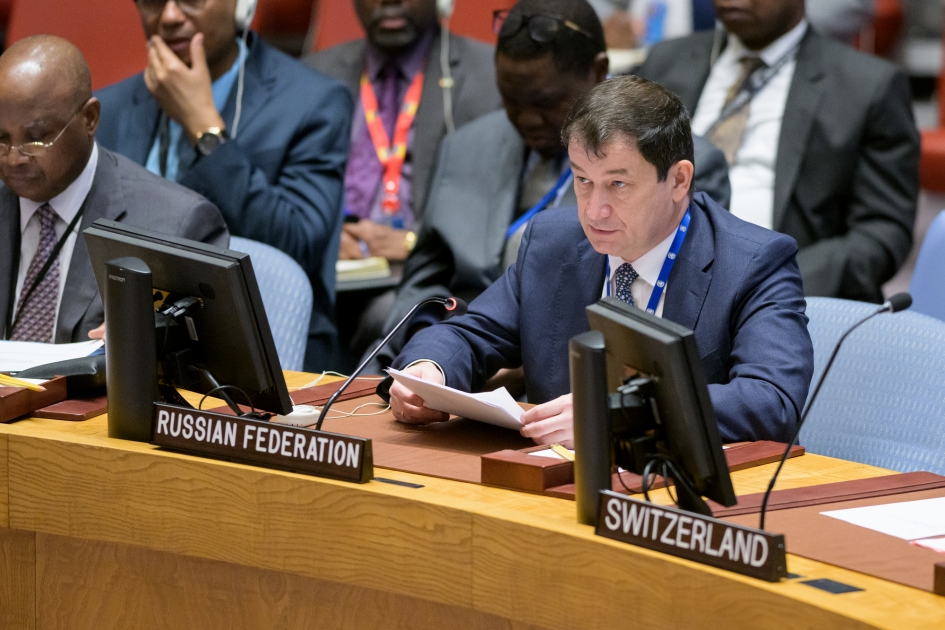Statement by Chargé d'Affaires of the Russian Federation Dmitry Polyanskiy at UNSC briefing on the political and humanitarian situation in Syria
Mme.President,
We thank Special Envoy Geir Pedersen and OCHA Director of Coordination Ramesh Rajasingham for their briefing on the political and humanitarian aspects of the situation in the Syrian Arab Republic.
The situation on the ground in our friendly Syria remains tense. Apart from the illegal military presence in northern Syria, including the deployment of the US and its allies in cross-Euphrates area, additional risks are created by arbitrary strikes of Israeli air force against Damascus and its suburbs, the latest of which took place on 19 July. Another reason for concern is the activity of terrorists in southern Syria, who are making use of the so-called security area near Al-Tanf that was established by Washington.
Mme.President,
It is our understanding that the return of the SAR in the Arab family and recovery of relations with Türkiye improves the overall environment in the Middle East and helps to overcome the consequences of the Syrian crisis. In this context, attempts by Western states to impede these natural processes look clumsy and out-of-place. We view such unconstructive steps as an interference in sovereign decision-making and politicizing of purely humanitarian aspects, such as early recovery and return of refugees.
Mme.President,
Russia has always stood for a Syrian-owned and Syrian-led political settlement to proceed with UN support and in full compliance with UNSC resolution 2254. We are convinced that modalities of international mediation should be based on respect for the principles of sovereignty, independence, unity, and territorial integrity of Syria. It is the Syrians themselves who should come to an agreement on all outstanding issues relating to future structure of state.
There is and has been only one platform for such direct inter-Syrian dialogue, namely the Constitutional Committee. Attempts to impose alien frameworks, formulae, or schemes but lead the situation in a deadlock. The Committee will resume its work once the sides pick a convenient venue to replace the Swiss one. As we take it, this is about to happen soon enough.
Speaking of humanitarian aspects of the Syrian settlement, it has been only five days since the General Assembly discussed this issue, so there is nothing we can add to what we said last Wednesday.
We are glad that international humanitarian assistance to the people of Syria will be provided in the same way as in any other country-specific context, that is upon consent of and in close coordination with the internationally recognized government of the country. We trust that the UN humanitarian team will take a responsible approach to the task of establishing cross-border humanitarian deliveries to Idlib in the new circumstances through Bab al-Hawa crossing, as it is happening already with Bab al-Salam and Al-Rai. Martin Griffiths and his team have every tool in their hands to make this happen. No additional Security Council decisions are required. It must be kept in mind that assistance must be delivered to those in need via all channels available, including cross-line routes.
We do hope that OCHA will not play along with interests of Western states, who become restless at the thought that the United Nations will have to interact properly with the legitimate Syrian authorities.
Humanitarians have received a good opportunity to start it all anew and prioritize the interests of those who truly need humanitarian assistance, including people in the governmental territory rather than internationally listed terrorists and its Western sponsors who are entrenched in Idlib. And do so appropriately, with full respect for sovereignty and territorial integrity of Syria.
You have a comprehensible and familiar tool, the UN humanitarian response plan for Syria, which remains strongly underfunded, as we heard again today. We call on the donors who put the interests of those in need above their geopolitical consideration to heed the UN call and help, in particular, finance early recovery projects throughout Syria.
Availing of this opportunity, I would like to ask a few question to the representative of UN OCHA.
What are the prospects of the UN country team in Syria report on the impact of unilateral sanctions on the humanitarian situation in the country? The “humanitarian wing” of the United Nations must not disregard this issue. After all, this is essentially a form of collective punishment of millions of ordinary Syrians. Otherwise, everything that we agree on here will idle.
Besides, given the new circumstances, we would appreciate an update on the status of the Secretary-General’s guideline “Parameters and principles of UN humanitarian assistance in Syria” that was issues for internal consumption in the UN Secretariat. As we know, this guideline prohibits UN structures from carrying out reconstruction activities on the ground.
This is the right moment to consign this shameful document to history.
Thank you.
